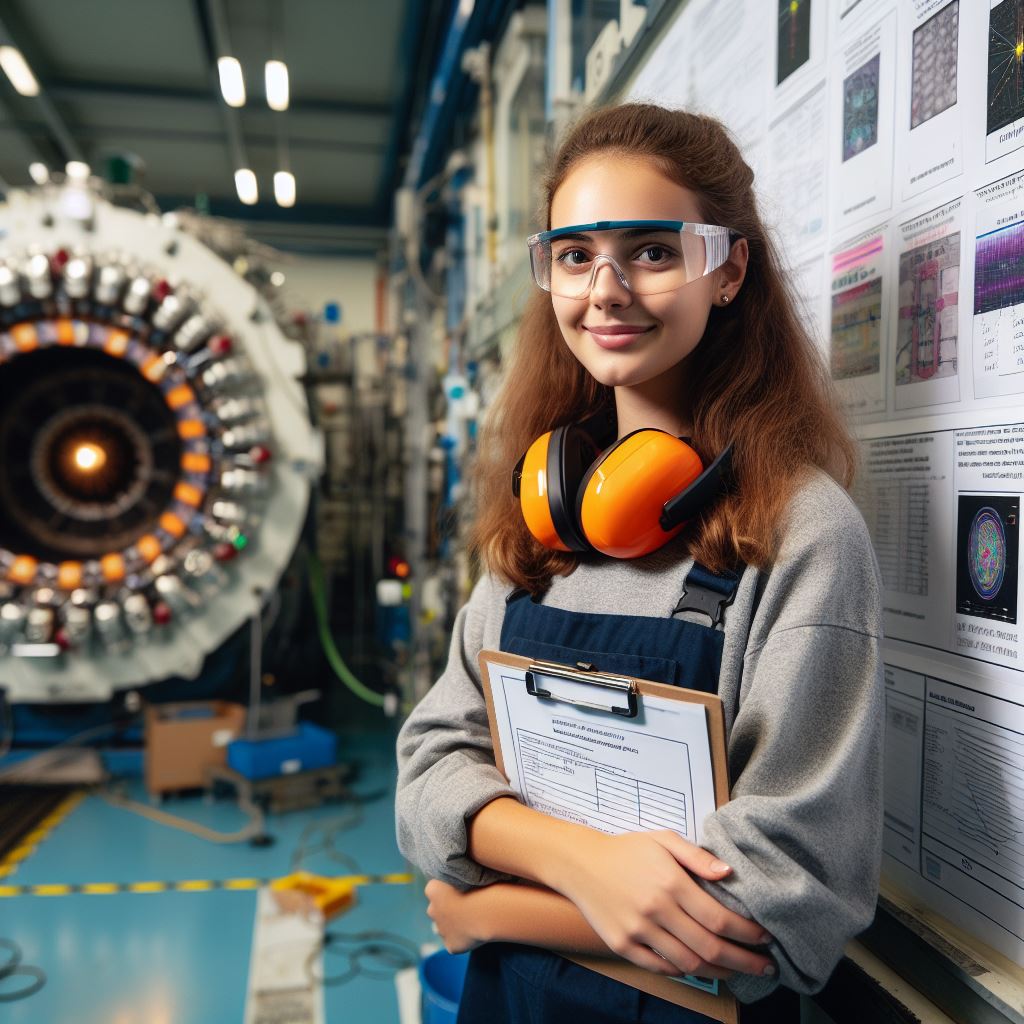Introduction
Balancing academia and industry in the field of physics is crucial for overall career development.
It offers diverse opportunities and challenges.
The significance of balancing academia and industry in the field of physics lies in the ability to bridge the gap between theoretical knowledge and practical application.
It allows physicists to contribute to both the advancement of scientific research and technological innovation in the industry.
Pursuing both academic and industry paths in physics presents unique challenges and benefits.
On one hand, academia provides a platform for continuous learning, conducting research, and contributing to scientific knowledge.
It offers opportunities for publications, collaborations, and teaching.
On the other hand, the industry offers physicists opportunities to apply their knowledge in real-world contexts and tackle practical problems.
It gives them a chance to work with cutting-edge technology, participate in product development, and contribute to innovations that can benefit society.
However, balancing both paths can also be challenging.
Time management becomes crucial as physicists need to fulfill their academic responsibilities while meeting industry deadlines.
Keeping up with advancements in both academia and industry requires continuous learning and staying updated with the latest research and technological advancements.
Basically, balancing academia and industry in the field of physics is of utmost significance.
It offers a unique opportunity to contribute to scientific knowledge and also make tangible contributions to society through practical applications.
While challenges exist, the benefits outweigh them, making it a rewarding and fulfilling career choice.
Part 1: The Importance of Academic Knowledge
Advancing the Field of Physics
Academic knowledge and research play a crucial role in pushing the boundaries of physics forward.
Academia provides a platform for scientists to explore new theories, conduct experiments, and make groundbreaking discoveries.
Without the pursuit of academic knowledge, the field of physics would stagnate, hindering progress and innovation.
Deepening Understanding and Innovation in Theoretical Concepts
Academia offers opportunities for physicists to delve deeper into theoretical concepts.
Through rigorous study, researchers gain a profound understanding of the fundamental principles that govern the universe.
This deep knowledge allows for innovation and the development of new theoretical frameworks that can shape the future of physics.
Fostering Critical Thinking and Problem-Solving Skills
Academia plays a vital role in fostering critical thinking and problem-solving skills among physics students.
Through challenging coursework and research projects, students learn to think analytically and approach complex problems with creativity.
These skills are essential not only for academic success but also for excelling in industry and making meaningful contributions to society.
Academic knowledge and research are the foundation on which the field of physics stands.
The pursuit of knowledge in academia not only advances science but also impacts various industries.
Academic research often leads to breakthrough discoveries that can have practical applications in areas such as technology or healthcare.
Balancing Academia and Industry
The Importance of Industry
While academia forms the foundation of physics, industry serves as the bridge to real-world applications.
The collaboration between academia and industry is crucial for translating theoretical knowledge into practical innovations.
Industry provides physicists with opportunities to apply their expertise to solve real-world problems and contribute to technological advancements.
Benefits of Industry Experience
Working in the industry alongside academia offers physicists valuable insights and experience.
Industry professionals often face practical challenges that require interdisciplinary approaches and quick problem-solving.
By bridging the gap between theory and application, industry experience enhances a physicist’s skill set and prepares them for diverse career paths.
Finding a Balance
Balancing academia and industry can be challenging but also rewarding.
Engaging in academic research expands theoretical knowledge and provides a deep understanding of physics principles.
On the other hand, industry experience offers practical skills, real-world applications, and opportunities for collaboration.
To strike a balance between academia and industry, physicists might choose to pursue joint appointments or engage in partnerships.
This allows them to contribute to both realms simultaneously and fully utilize their expertise.
Furthermore, internships or part-time industry positions during academic studies can provide firsthand industry experience while not sacrificing academic progress.
Essentially, academia and industry are both essential for the advancement of physics.
Academic knowledge and research provide the foundation for progress, while industry offers the opportunity for practical application and innovation.
Striking a balance between these two realms can lead to a fulfilling and impactful career in physics.
Read: Biology Fieldwork in Australia: What to Expect
Part 2: The Relevance of Industry Experience
In addition to the academic side of physics, industry experience plays a crucial role in shaping a physicist’s career. Here is why:
Practical Application of Physics in Various Industries
- Physics finds practical application in numerous industries such as technology, engineering, and healthcare.
- Physicists contribute to the development of advanced medical equipment, like MRI machines and radiation therapy devices.
- The automotive industry utilizes physics principles to enhance vehicle safety through crash test simulations.
- In renewable energy, physicists work on developing efficient solar panels and wind turbines.
- Understanding the behavior of materials helps physicists contribute to the aerospace industry by designing stronger and lighter structures.
Enhancement of Problem-Solving Skills through Real-World Challenges
- Industry experience exposes physicists to real-world challenges that require practical problem-solving skills.
- Physicists in industry are often faced with complex problems that demand creative solutions.
- Working on these challenges enhances their ability to think critically and apply theoretical knowledge to practical situations.
- Industry experience teaches physicists the importance of teamwork and effective communication in problem-solving processes.
- The ability to adapt to new technologies and learn quickly is also developed through industry experience.
Potential Career Opportunities in Industry for Physicists
- Industry offers a wide range of career opportunities for physicists beyond traditional academic paths.
- Physicists can find employment in research and development departments of technology companies.
- Financial institutions often hire physicists for their analytical and problem-solving skills for data analysis and modeling.
- Consulting firms seek physicists to provide expertise in fields such as energy efficiency and risk assessment.
- Government agencies also hire physicists for roles related to national defense, environmental policy, and scientific research.
Overall, industry experience provides physicists with invaluable opportunities to apply their knowledge in real-world scenarios, enhancing their problem-solving skills and expanding their career options beyond academia.
Read: Networking in Biology: Australian Conferences

Part 3: Strategies for Balancing Academia and Industry
Importance of Finding a Balance
In the field of physics, striking a balance between academic pursuits and industry experience is crucial for success. Theoretical knowledge gained through academics must be complemented with practical skills and real-world experience from industry.
By finding a balance, physics students can enhance their understanding of theoretical concepts while also developing the skills necessary for applying their knowledge in a professional setting.
Both academia and industry have unique benefits to offer, and finding a balance allows individuals to gain a well-rounded education and skillset.
Tips for Time Management
Managing time effectively is essential for physics students attempting to juggle academic commitments and gain industry experience.
Your Personalized Career Strategy
Unlock your potential with tailored career consulting. Get clear, actionable steps designed for your success. Start now!
Get StartedHere are some tips to help physics students manage their time effectively:
- Create a schedule: Plan your days and allocate time for both academic work and industry-related activities.
- Prioritize tasks: Identify the most important and urgent tasks to complete them first.
- Avoid distractions: Minimize distractions such as social media and prioritize focusing on the tasks at hand.
- Delegate when possible: If there are opportunities to delegate non-academic tasks to others, take advantage of them.
- Take breaks: Allow yourself regular breaks to rest and recharge, which can improve overall productivity.
Networking Opportunities and Internships
Engaging in networking opportunities and internships is essential for gaining industry experience while pursuing academics.
Consider the following strategies to gain valuable industry exposure and expand professional networks:
- Attend conferences and seminars: Participate in industry events to interact with professionals and learn about the latest developments.
- Join professional organizations: Become a member of organizations related to your field of interest to connect with industry experts.
- Seek internships: Apply for internships in relevant companies or research institutes to gain hands-on experience.
- Utilize university resources: Explore internship programs and career services offered by your university to find relevant opportunities.
- Connect with alumni: Reach out to alumni who have successfully balanced academia and industry, and seek their guidance.
By participating in such activities, physics students can establish connections, gain practical experience, and increase their chances of finding suitable positions in industry while continuing their academic pursuits.
Overall, finding a balance between academia and industry is crucial for physics students.
By effectively managing their time, seeking out networking opportunities, and pursuing internships, students can develop a solid foundation of theoretical knowledge combined with practical experience, enabling them to excel in both academic and professional realms.
Read: Marine Biology in Australia: Study & Work
Delve into the Subject: Health Research: AU’s Top Institutes
Part 4: Success Stories of Physics Professionals
In this section, we will share anecdotal stories of individuals who have successfully balanced academia and industry in physics.
These success stories highlight how these professionals leveraged their academic and industry backgrounds to achieve remarkable achievements and push the boundaries of physics.
Dr. Maria Rodriguez: Revolutionizing Renewable Energy
- Dr. Maria Rodriguez completed her PhD in physics while working part-time at a renewable energy startup.
- She used her academic knowledge to develop innovative solar panel designs, significantly improving their efficiency.
- Dr. Rodriguez’s industry experience allowed her to understand the market demands and tailor her inventions accordingly.
- Her groundbreaking solar panels are now being widely adopted, revolutionizing the renewable energy sector.
Dr. Jonathan Barnes: Bridging the Gap Between Theory and Application
- With a strong academic background and a keen interest in practical applications, Dr. Jonathan Barnes excelled in both academia and industry.
- He worked as a research scientist at a leading physics institute while collaborating with industry partners.
- Dr. Barnes’s research on quantum computing algorithms has paved the way for breakthroughs in practical quantum computing.
- His collaboration with industry has allowed his theoretical advancements to be applied in real-world scenarios.
Dr. Sarah Patel: A Physicist Making Medical Breakthroughs
- Dr. Sarah Patel pursued a career in medical physics, balancing her academic pursuits with industry internships in healthcare.
- By combining her physics knowledge with hands-on experience in hospitals, she developed innovative imaging techniques.
- Dr. Patel’s inventions have revolutionized medical diagnostics, enabling earlier and more accurate disease detection.
- Her contributions have significantly impacted the field of medical physics, saving countless lives.
Dr. Michael Chen: From Academia to Entrepreneurship
- After completing his PhD in physics, Dr. Michael Chen co-founded a startup company based on his research findings.
- His academic background provided him with the necessary expertise to develop cutting-edge technologies.
- Dr. Chen’s company has developed advanced sensors that have transformed various industries, from aerospace to telecommunications.
- His entrepreneurial journey showcases how academia and industry can synergize to drive innovation and economic growth.
These success stories exemplify how individuals have successfully balanced academia and industry in physics, leveraging their diverse backgrounds to achieve remarkable achievements.
The contributions of these professionals have not only pushed the boundaries of physics but also impacted various industries and improved the quality of life for many.
Their stories serve as inspiration for aspiring physicists looking to navigate the dual paths of academia and industry.
Read: Australian Biologists’ Role in Global Science
Discover More: Interview Tips for Aspiring Lab Techs
Conclusion
In closing, it is crucial to strike a balance between academia and industry in the field of physics.
Both paths offer unique opportunities and can greatly contribute to a well-rounded career.
Aspiring physicists should explore both academia and industry to gain a broader perspective and expand their skillset.
This will not only enhance their knowledge but also increase their flexibility in the job market.
It is important to remember that finding the right balance is subjective and may vary for each individual.
Some may choose to focus solely on academia, while others may prefer a career in industry.
However, regardless of the chosen path, continuous learning and staying updated with advancements in both academia and industry are crucial.
This will ensure that physicists remain competent and adaptable in an ever-evolving field like physics.
Lastly, aspiring physicists should always follow their passion and consider their long-term career goals when deciding how to balance academia and industry.
A well-thought-out plan and staying open to new opportunities will pave the way for a successful and fulfilling career.
So, to all physics enthusiasts out there, embrace the benefits of both academia and industry and strive for a unique and balanced career in the fascinating world of physics!




